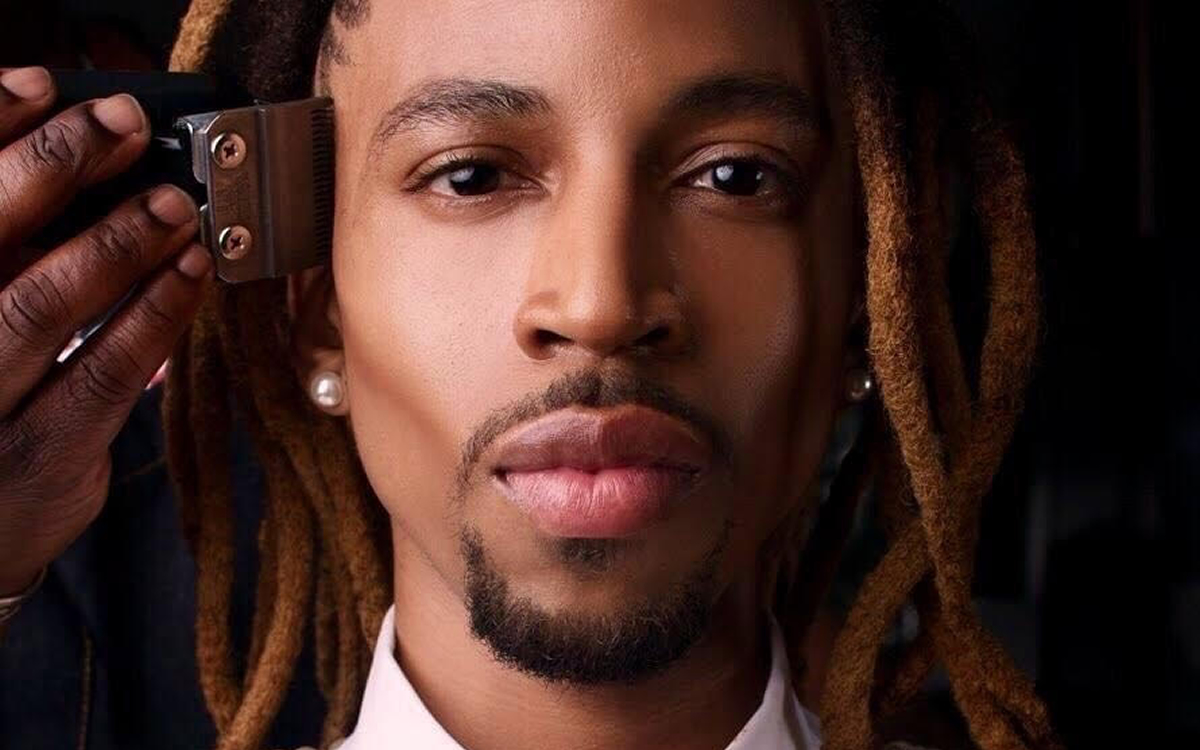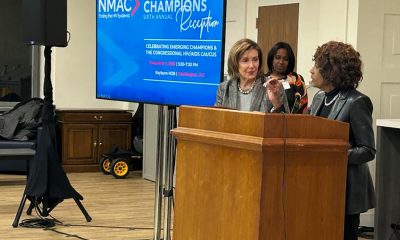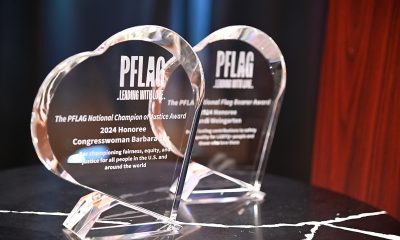Arts & Entertainment
March on Washington Film Festival boasts stellar queer content
Hybrid format features films, panel discussions, theater, and VR lab

Kevin Kodama, a 26-year-old, queer, Asian-American filmmaker, was saddened and angered by the rise in anti-Asian hate crimes during the pandemic. Then, he was a student studying film at San Francisco State University. “One of my professors encouraged me to channel my feelings {about the hate crimes} into a short film,” Kodama told the Blade.
Kodama took his professor’s advice. He wrote and directed “Shikata Ga Nai,” a poignant, compelling fantasy romance, set in a Japanese concentration camp where a lesbian couple attempts to reconcile their relationship as ghosts.
Kodama is one of the many filmmakers, theater legends and civil rights heros whose work will be showcased and honored at the March on Washington Film Festival (MOWFF) 2022 from Sept. 28 to Oct. 2.
MOWFF, in a hybrid in person and streaming format, will feature films, panel discussions, theatrical performances and the first-ever VR {virtual reality} Equity Lab in the Nation’s Capital.
From its honorees to its emerging filmmakers, the Festival has a strong queer quotient.
In its 10th year, the Festival celebrates African-American legends of theater and film who have advanced civil rights. Its theme this year is “STORY, STAGE & SCREEN.” To purchase tickets to the Festival, click here.
MOWFF was founded in 2013 on the 50th anniversary of the 1963 March on Washington. Now in its 10th year, the Festival uses the power of film, music, scholarship to tell untold stories of the unsung heroes of the American Civil Rights movement. The Festival shares these narratives to connect the past to the present and the future. For information about the Festival go to: marchonwashingtonfilmfestival.org.
MOWFF is committed to highlighting stories at the intersection of racial and LGBTQIA+ justice, David Andrusia, executive director of the Festival, told the Blade.
“We want to correct stories that have been mistold,” Andrusia, who is gay, said, “Too many are silenced and kept from telling their stories.”
This year, the Festival will bestow the John Lewis Lifetime Legacy Award to Rep. Barbara Lee, a founding member and a Vice Chair of the Congressional LGBTQ+ Equality Caucus and the Chair of the Congressional HIV/AIDS Caucus.
MOWFF2022’s other honorees are George C. Wolfe, Tony-winning director of “Angels in America” whose upcoming film “Bayard Rustin” celebrates the gay rights legend, and pioneering lesbian publicist and producer Irene Gandy, a two-time Tony Award-winner.
Lewis, Wolfe and Gandy will be honored on the Festival’s opening night.
Gandy, 78, is glad that MOWFF is being held now. “So that young people can learn about and remember Black community activists and artists who’ve fought for civil rights,” she told the Blade.
It’s important that people not forget that Harry Belafonte, Nina Simone, Mahalia Jackson and other artists were part of the 1963 March on Washington, Gandy said. “We have to honor the legacy and continue the activism of these artists,” she added.
Gandy doesn’t go into meetings thinking “I’m Black” or “I’m gay.” “That deafeats everything for everybody. It crowds all the good things out.”
There’s a long way to go, but things are changing, Gandy, who for over 50 years has been the only Black female press agent member of the Association of Theatrical Press Agents and Managers (ATPAM).
“There are more Black shows now – with Black actors and produces,” she said, “with more Black managers making decisions.”
In addition to being a groundbreaking press agent and producer, Gandy is a fashionista. In 2008, she became the first female press agent to be immortalized with a Sardi’s caricature. Known for her furs, in 2015, Gandy launched
a signature collection featured in “Vogue” and her Lady Irene Fur line debuted earlier this year.
On a recent evening as she walked out of a theater on to Broadway, Gandy had an awesome encounter with a father and his five-year-old child. “The child was trans,” she said, “the child was biologically a boy. But when the Dad called him by a boy’s name, the child said ‘I’m a girl.’”
“This little, trans person didn’t know who I was – that I had won the Tonys,” Gandy said, “but she said to me ‘I love your style!’”
If they know who they are, everyone has a story to tell, she added.
The stories to be highlighted at the Festival include “Maurice Hines: Bring Them Back,” an intimate portrait of the trailblazing Black entertainer; “Mankiller,” a documentary about Wilma Mankiller, who became the Cherokee Nation’s first Principal Chief in 1985; and “The Defenders,” about lawyers who fought for civil rights in Mississippi in the early years of the civil rights movement.
After his meeting with his professor, Kodama had the idea of doing a story set in the concentration camps where Japanese Americans were interred during World War II.
“It’s a way of bridging the history of anti-Asian policies of that time with the anti-Asian racism and hate crimes of today,” he said.
Queer people who were interred during the War had to be closeted. “For most of the decades after the War, queer people were left out of stories told about the camps,” Kodama said.
“Because of homophobia – discomfort with queerness,” he added, “people didn’t talk about it. Same-sex couples had to pass as friends.”
“Shikata Ga Nai” was filmed on the site of one of the camps – Manzanar in Inyo County, California (a National Historic Site run by the National Park Service). “One of the nice things about my film is it will get people to talk about it {queer people in the camps} who haven’t talked about it.” (The film will be shown at MOWFF as part of the Student and Emerging Filmmaker Competitions.)
Derrick L. Middleton, a talented, 35-year-old, Black, gay filmmaker, uses his art to tell stories.
Middleton, born in Harlem in New York City, knew as a little boy that he was different. “I wasn’t yet labeled as ‘gay,’ but I felt like I didn’t fit in,” he told the Blade.
“It felt unnatural to try to be masculine in the way I was expected to be,” he added.
He, like other Black queer men, ran up against hyper-masculinity, when he went to a barbershop.
“Barbershops are critically important to the Black community,” Middleton said, “I want to honor them.”
When Black people were enslaved, one of the few things they could learn was how to cut hair, Middleton said. “When they were freed, owning a barbershop was one of the few businesses they could run,” he added.
But, heteronormity rules in many Black barbershops. Subtle or overt anti-queer slur often make you feel unsafe if you’re queer and Black in a Black barbershop.
“I had already come out to my family and friends,” Middleton said, “but I felt, to be safe, I had to go back into the closet when I went to a the barbershop.”
One day, he became angry and scared when he went to a Black barbershop. “The barber told me that he didn’t cut hair for sissies,” Middleton said.
He was so frightened that he couldn’t think of anything to say and ran out of the barbershop.
Out of this experience, Middleton made “Shape Up: Gay in the Black Barbershop,” an eye-opening, engrossing, moving documentary short about the stories of himself and other queer Black men in Black barbershops. The film premiered in 2016 at the White House and was awarded the Grand Prize for Emerging Documentary by the March on Washington Film Festival.
“I never thought that I, a boy who grew up in Harlem, would get an award at a White House ceremony when the country had a Black president,” Middleton said, “It was a dream come true.”
This year, Middleton has been selected for a VR Equity Lab and Fellowship. His work will be showcased in the Festival’s VR Equity Lab. Middleton’s VR Equity Lab project “Shape Up: Gay in the Black Barbershop” (The Series). The series is a spinoff that takes viewers on a journey to barbershops from different countries in the African Diaspora, using 360-degree video and animated interactive scenes to give viewers an immersive experience from the perspective of LGBTQ people.
“I hope that the Series will be mainstreamed on a platform like Hulu or Netflix,” Middleton said, “so that people who aren’t able to access it through VR will be able to see it.”
Books
Love or fear flying you’ll devour ‘Why Fly’
New book chronicles a lifetime obsession with aircraft

‘Why Fly’
By Caroline Paul
c. 2026, Bloomsbury
$27.99/256 pages
Tray table folded up.
Check. Your seat is in the upright position, the airflow above your head is just the way you like it, and you’re ready to go. The flight crew is making final preparations. The lights are off and the plane is backing up. All you need now is “Why Fly” by Caroline Paul, and buckle up.

When she was very young, Paul was “obsessed” with tales of adventure, devouring accounts written by men of their derring-do. The only female adventure-seeker she knew about then was Amelia Earhart; later, she learned of other adventuresome women, including aviatrix Bessie Coleman, and Paul was transfixed.
Time passed; Paul grew up to create a life of adventure all her own.
Then, the year her marriage started to fracture, she switched her obsession from general exploits to flight.
Specifically, Paul loves experimental aircraft, some of which, like her “trike,” can be made from a kit at home. Others, like Woodstock, her beloved yellow gyrocopter, are major purchases that operate under different FAA rules. All flying has rules, she says, even if it seems like it should be as freewheeling as the birds it mimics.
She loves the pre-flight checklist, which is pure anticipation as well as a series of safety measures; if only a relationship had the same ritual. Paul loves her hangar, as a place of comfort and for flight in all senses of the word. She enjoys thinking about historic tales of flying, going back before the Wright Brothers, and including a man who went aloft on a lawn chair via helium-filled weather balloons.
The mere idea that she can fly any time is like a gift to Paul.
She knows a lot of people are terrified of flying, but it’s near totally safe: generally, there’s a one in almost 14 million chance of perishing in a commercial airline disaster – although, to Paul’s embarrassment and her dismay, it’s possible that both the smallest planes and the grandest loves might crash.
If you’re a fan of flying, you know what to do here. If you fear it, pry your fingernails off the armrests, take a deep breath, and head to the shelves. “Why Fly” might help you change your mind.
It’s not just that author Caroline Paul enjoys being airborne, and she tells you. It’s not that she’s honest in her explanations of being in love and being aloft. It’s the meditative aura you’ll get as you’re reading this book that makes it so appealing, despite the sometimes technical information that may flummox you between the Zen-ness. It’s not overwhelming; it mixes well with the history Paul includes, biographies, the science, heartbreak, and exciting tales of adventure and risk, but it’s there. Readers and romantics who love the outdoors, can’t resist a good mountain, and crave activity won’t mind it, though, not at all.
If you own a plane – or want to – you’ll want this book, too. It’s a great waiting-at-the-airport tale, or a tuck-in-your-suitcase-for-later read. Find “Why Fly” and you’ll see that it’s an upright kind of book.
The Blade may receive commissions from qualifying purchases made via this post.
Theater
Out actor Kevin Cahoon on starring role in ‘Chez Joey’
Arena production adapted from Broadway classic ‘Pal Joey’

‘Chez Joey’
Through March 15
Arena Stage
1101 Sixth St., S.W.
Tickets start at $93
Arenastage.org
As Melvin Snyder in the new musical “Chez Joey,” out actor Kevin Cahoon plays a showbiz society columnist who goes by the name Mrs. Knickerbocker. He functions as a sort of liaison between café society and Chicago’s Black jazz scene circa 1940s. It’s a fun part replete with varied insights, music, and dance.
“Chez Joey” is adapted from the Broadway classic “Pal Joey” by Richard Rodgers and Lorenz Hart. It’s inspired by John O’Hara’s stories based on the exploits of a small-time nightclub singer published in The New Yorker.
A warm and humorous man, Cahoon loves his work. At just six, he began his career as a rodeo clown in Houston. He won the Star Search teen division at 13 singing songs like “Some People” from “Gypsy.” He studied theater at New York University and soon after graduating set to work playing sidekicks and comedic roles.
Over the years, Cahoon has played numerous queer parts in stage productions including “Hedwig and the Angry Inch,” “La Cage aux Folles,” “Rocky Horror” as well as Peanut in “Shucked,” and George the keyboardist in “The Wedding Singer,” “a sort of unicorn of its time,” says Cahoon.
Co-directed by Tony Goldwyn and the great Savion Glover, “Chez Joey” is a terrific and fun show filled with loads of talent. Its relevant new book is by Richard Lagravenese.
On a recent Monday off from work, Cahoon shared some thoughts on past and current happenings.
WASHINGTON BLADE: Is there a through line from Kevin, the six-year-old rodeo clown, to who we see now at Arena Stage?
KEVIN CAHOON: Anytime I want to land a joke in a theater piece it goes back to that rodeo clown. It doesn’t matter if it’s Arena’s intimate Kreeger Theatre or the big rodeo at the huge Houston Astrodome.
I was in the middle stadium and there was an announcer — a scene partner really. And we were doing a back and forth in hopes of getting laughs. At that young age I was trying to understand what it takes to get laughs. It’s all about timing. Every line.
BLADE: Originally, your part in “Chez Joey” Melvin was Melba who sings “Zip,” a clever woman reporter’s song. It was sort of a star feature, where they could just pop in a star in the run of “Pal Joey.”
CAHOON: That’s right. And in former versions it was played by Martha Plimpton and before her Elaine Stritch. For “Chez Joey,” we switched gender and storyline.
We attempted to do “Zip” up until two days before we had an audience at Arena. Unexpectedly they cut “Zip” and replaced it with a fun number called “I Like to Recognize the Tune,” a song more connected to the story.
BLADE: Wow. You must be a quick study.
CAHOON: Well, we’re working with a great band.
BLADE: You’ve played a lot of queer parts. Any thoughts on queer representation?
CAHOON: Oh yes, definitely. And I’ve been very lucky that I’ve had the chance to portray these characters and introduce them to the rest of the world. I feel honored.
After originating Edna, the hyena on Broadway in “The Lion King,” I left that to do “Hedwig and the Angry Inch” as standby for John Cameron Mitchell, doing one show a week for him.
Everyone thought I was crazy to leave the biggest musical of our time with a personal contract and getting paid more money that I’d ever made to get $400 a week at the downtown Jane Street Theatre in a dicey neighborhood.
At the time, I really felt like I was with cool kids. I guess I was. And I never regretted it.
BLADE: When you play new parts, do you create new backstories for the role?
CAHOON: Every single time! For Melvin, I suggested a line about chorus boys on Lakeshore Drive.
BLADE: What’s up next for Kevin Cahoon?
CAHOON: I’m about to do the New York Theatre Workshop Gala; I’ve been doing it for nine years in a row. It’s a huge job. I’ll also be producing the “Cats: The Jellicle Ball” opening on Broadway this spring; it’s a queer-centric uptown vogue ball with gay actor André de Shields reprising his role as “Old Deuteronomy.”
BLADE: There’s a huge amount of talent onstage in “Chez Joey.”
CAHOON: There is. I’m sharing a dressing room with Myles Frost who plays Joey. He won accolades for playing Michael Jackson on Broadway. We’ve become great friends. He’s a miracle to watch on stage. And Awa [Sal Secka], a D.C. local, is great. Every night the audience falls head over heels for her. When this show goes to New York, Awa will, no doubt, be a giant star.
BLADE: Do you think “Chez Joey” might be Broadway bound?
CAHOON: I have a good feeling it is. I’ve done shows out of town that have high hopes and pedigree, but don’t necessarily make it. “Chez Joey” is a small production, it’s funny, and audiences seem to love it.

The Capital Pride Alliance held the annual Pride Reveal event at The Schuyler at The Hamilton Hotel on Thursday, Feb. 26. The theme for this year’s Capital Pride was announced: “Exist. Resist. Have the audacity!”
(Washington Blade photos by Michael Key)











































